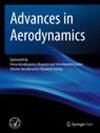Some effects of domain size and boundary conditions on the accuracy of airfoil simulations
IF 2.3
3区 工程技术
Q2 ENGINEERING, MECHANICAL
引用次数: 0
Abstract
This paper investigates a specific case of one of the most popular fluid dynamic simulations, the incompressible flow around an airfoil (NACA 0012 here) at a high Reynolds number ( $$6 \times 10^6$$ ). OpenFOAM software was used to study the effect of domain size and four common choices of boundary conditions on airfoil lift, drag, surface friction, and pressure. We also examine the relation between boundary conditions and the velocity, pressure, and vorticity distributions throughout the domain. In addition to the common boundary conditions, we implement the “point vortex” boundary condition that was introduced many years ago but is now rarely used. We also applied the point vortex condition for the outlet pressure instead of using the traditional Neumann condition. With the airfoil generating significant lift at incidence angles of $$5^\circ , 10^\circ$$ , and $$14^\circ$$ , we confirm a previous finding that the boundary conditions combine with domain size to produce an induced (pressure) drag. The change in the pressure drag with domain size is significant for the commonly-used boundary conditions but is much smaller for the point vortex alternative. The point vortex boundary condition increases the execution time, but this is more than offset by the reduction in domain size needed to achieve a specified accuracy in the lift and drag. This study also estimates the error in total drag and lift due to domain size and shows it can be almost eliminated using the point vortex boundary condition. We also used the impulse form of the momentum equations to study the relation between drag and lift and spurious vorticity, which is generated as a result of using non-exact boundary conditions. These equations reveal that the spurious vorticity throughout the domain is associated with cancelling circulation around the domain boundaries.域尺寸和边界条件对机翼模拟精度的一些影响
本文研究了最流行的流体动力学模拟之一的一个具体案例,即高雷诺数($$6 \times 10^6$$)下机翼(此处为 NACA 0012)周围的不可压缩流动。我们使用 OpenFOAM 软件研究了领域大小和四种常见边界条件对机翼升力、阻力、表面摩擦力和压力的影响。我们还研究了边界条件与整个域的速度、压力和涡度分布之间的关系。除了常见的边界条件外,我们还实施了 "点涡流 "边界条件,该条件多年前就已提出,但现在已很少使用。我们还对出口压力采用了点涡流条件,而不是传统的诺依曼条件。机翼在入射角为 $$5^\circ$ 、10^\circ$$ 和 $$14^\circ$ 时会产生很大的升力,我们证实了之前的一个发现,即边界条件与域尺寸相结合会产生诱导(压力)阻力。对于常用的边界条件来说,压力阻力随领域大小的变化是显著的,但对于点涡旋替代方案来说,这种变化要小得多。点涡流边界条件增加了执行时间,但为了达到指定的升力和阻力精度,减少了所需的域尺寸,因此抵消了增加的执行时间。本研究还估算了由于域大小造成的总阻力和升力误差,结果表明使用点涡流边界条件几乎可以消除这种误差。我们还利用动量方程的脉冲形式研究了阻力和升力与虚假涡度之间的关系,虚假涡度是由于使用非精确边界条件而产生的。这些方程显示,整个域内的虚假涡度与域边界周围的抵消环流有关。
本文章由计算机程序翻译,如有差异,请以英文原文为准。
求助全文
约1分钟内获得全文
求助全文

 求助内容:
求助内容: 应助结果提醒方式:
应助结果提醒方式:


